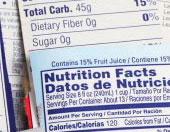Dental health tips
Posted in General Health & Wellness on June 14, 2011 by NebraskaHealth.com staff. Last modified on April 21, 2019. Read disclaimer.

Want to keep your chompers healthy? Follow these 8 tips to keep your teeth in tip-top shape.
Step 1: Understand your unique oral health needs
The food you eat, the type and amount of saliva in your mouth and your overall health condition all help determine your oral health. Certain medications, pregnancy and breathing problems can result in dry mouth and increased plaque formation.
Step 2: Brush and floss regularly
You should brush your teeth at least twice a day and floss at least once a day. Both activities remove plaque (a complex mass of bacteria) that constantly forms on your teeth. The plaque can be removed with brushing but, once it hardens to become tartar, it can be removed only with a professional cleaning.
Bacteria in plaque and tartar can become gingivitis (mild gum disease) and, if left untreated, lead to periodontitis -- a loss of bone and connective tissue that hold the teeth in place.
+ Free Shipping & Returns on Eligible Items.
(*Amazon's Top 100 list updated hourly.)
Step 3: Limit sugary snacks and eat a balanced diet
Every time you eat food containing sugars or starches, your teeth are exposed to these acids for over 20 minutes! These acid attacks can break down the enamel surface of your teeth. If you have a sugary snack, rinse your mouth with water to dilute the acids and then, brush your teeth 30-60 later. (Brushing immediately after an acidic meal or drink can actually cause MORE enamel to be eroded from your teeth.) It's also important to eat a balanced diet; it provides minerals and vitamins that can improve your oral health.
Step 4: Stop smoking (for lots of reasons)
Smoking or using smokeless increases your risk of oral cancer, periodontal disease and tooth decay. Tobacco use also contributes to bad breath and stains your teeth.
Step 5: Examine your mouth regularly
Examine your mouth weekly to look for changes that could include:
- Swollen gums
- Chipped or discolored teeth
- Sores or lesions on gums or tongue.
Step 6: Visit the dentist regularly
Many people think an annual visit to the dentist is sufficient. However, you should talk to your dentist about frequency of visits if you have a history of cavities, high blood sugar or are undergoing cancer treatment. Smokers and gum disease sufferers may also require more visits.
Can't afford to visit the dentist? Check www.ada.org for a dental school or www.adha.org for a dental hygiene school in your area. They may offer low-cost services as part of their training. In additions, some counties and states provide dental clinics at reduced rates while United Way and the government's Health Resources and Services Administration (888-275-4772 or www.hrsa.gov) may be able to suggest local low-cost dental service providers.
Step 7: Wear protective mouth guards when involved in contact sports
Step 8: Don't ignore oral health problemsSee your dentist as soon as possible if you have the following problems:
- Red, tender or swollen gums
- Gums that bleed when brushed or flossed
- Loose permanent teeth
- Changes in teeth alignment
- Unusual sensitivity to hot and cold
- Persistent bad breath or unusual taste in your mouth
Keep in mind that early detection and treatment of gum or teeth problems can help ensure continuously good oral health.

 Feeling blah? Boost your mood
Feeling blah? Boost your mood Tips for making fitness fun
Tips for making fitness fun Preparing for retirement
Preparing for retirement Summer heat safety tips
Summer heat safety tips Keeping your teeth in tip-top shape
Keeping your teeth in tip-top shape What are the nutritional needs of children?
What are the nutritional needs of children? Tips for preventing sunburns
Tips for preventing sunburns How to cook dried beans
How to cook dried beans Slow cooking beans in a crock pot
Slow cooking beans in a crock pot Medication safety tips
Medication safety tips Why are food allergies becoming so common?
Why are food allergies becoming so common? Foods associated with romance
Foods associated with romance